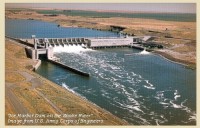Army Corps understates the impact
The Army Corps of Engineers reported last week that they spilled 1,500 gallons of fluid that contained PCBs at levels 14,000,000% greater than state and federal chronic water quality standards. PCBs are one of the most dangerous pollutants and cause cancer and harm the nervous system, the endocrine system, and reproduction.
The manufacturing of PCBs has been banned for decades. Despite these threats, the Corps' dams continue to use PCBs in oil and some equipment.
“This is a major spill,” stated Brett VandenHeuvel, Executive Director of Columbia Riverkeeper. “PCBs are highly toxic and don’t go away. The Corps’ discharge is dangerous and will threaten people who eat fish from the Snake River for years and years.”
According to the Oregonian, the Corps stated that “the PCB levels in the spilled oil appear to be below federal water quality standards but above state standards.”
Is this true? No, the Corps is wrong. The PCB concentration in the spill was 2,000 parts per billion. The Washington chronic water quality standard and the federal standard are both 0.014 parts per billion. 2,000 parts per billion is not below 0.014 parts per billion. The Corps spill is, in fact, 14,000,000% greater than the federal standard. Did the Corps deliberately misstate the water quality standard to downplay the impact of their spill? Or, did the Corps simply not know the water quality standard?
The 1,500 gallons of PCB-laden oil that the Corps' spilled added 11.35 grams of PCBs to the Snake River (for those that like math, the 2ppm spill = 2 milligrams/Liter, which converts to 11.35 grams for 1,500 gallons). 11.35 grams is a dangerous amount of PCBs. To put this in perspective, we looked at the Total Maximum Daily Load (TMDL) allowed by the Washington Department of Ecology for the Palouse River. This TMDL finds that only 11.68 grams of PCBs can be discharged from all sources over the course of an entire year. The Corps’ spill, therefore, is equivalent to an entire river's waste load allocation, which includes several sewage treatment plants and other sources.
Oil spills and toxic pollution are all too common from the Corps' dams. WA Department of Ecology is investigating the Ice Harbor spill and Riverkeeper is encouraging Ecology to enforce the law.
View Washington's Water Quality Standards
View Federal Water Quality Standards



